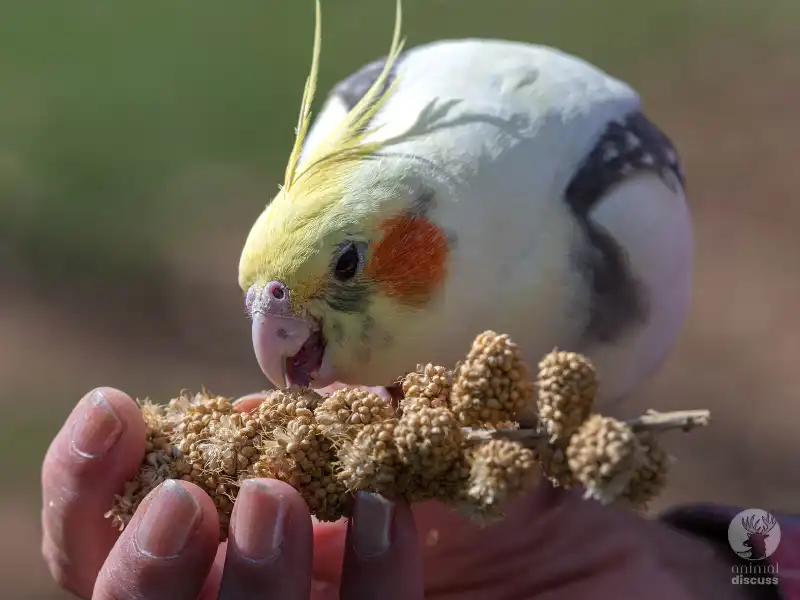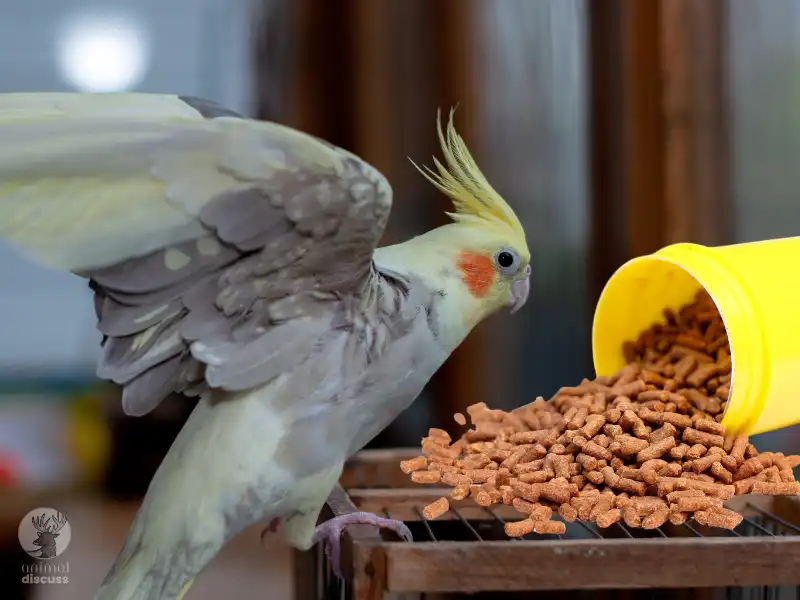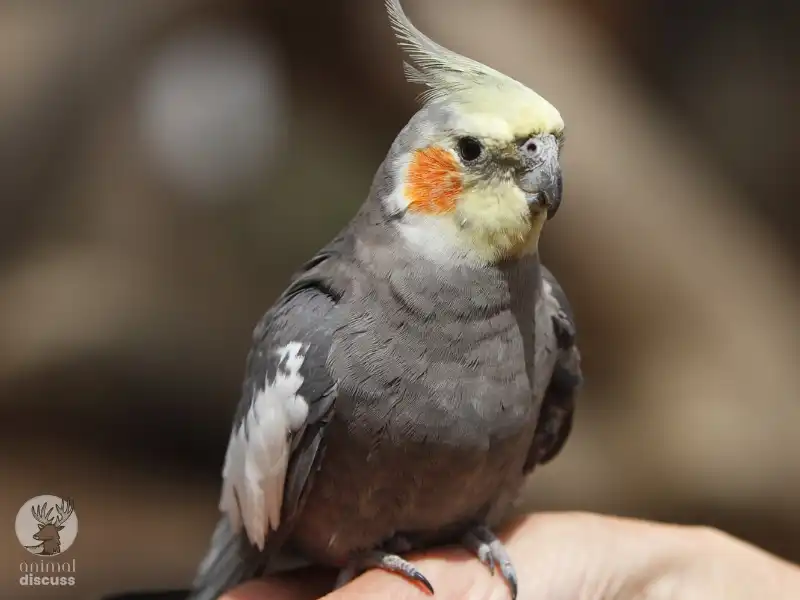Cockatiels’ eating habits are as varied as their colorful feathers. From delicious fruits to carefully crafted pellets, they prefer a diverse menu for their daily treat.
Do you know what Cockatiels eat? They are largely herbivorous. They prefer fruits, nuts, seeds, vegetables, and grains. But they may also consume small insects, and eggs for proteins. Besides, pet Cockatiels eat specially formulated pellets. These foods provide the necessary nutrition for their growth and metabolic processes.
In this article, I will discuss what Cockatiels naturally eat and how they digest those foods. I’m also going to discuss the factors that affect the eating habits of this bird and the remedies. Let’s uncover the mysterious eating habits of Cockatiels.
What Do Cockatiels Have On Their Menu?
Twenty percent of Cockatiels’ typical ration consists of fruits and fresh vegetables. Fruits give them Vitamin C and vegetables dole out Vitamin A. They may also consume small insects as a source of proteins.

Fruits provide Cockatiels with a range of vital vitamins and minerals for their good health. Thus, fruits are essential for a healthy balanced diet as they contain antioxidants and natural sugars that help maintain good health. Here’s the list of fruits that Cockatiels have –
- Bananas
- Apples
- Peaches
- Blackberries
- Guava
- Papaya
- Cherries
- Strawberries
However, seeds from fruits like apples contain cardio-toxic cyanide and avocados contain persin. These elements can cause danger for Cockatiels. So, it’s crucial to remove seeds while serving them fruits.
Vegetables guarantee a balanced nutritional uptake. These are rich in vitamins, fiber, and minerals which boost the digestive health of a Cockatiel. The list of vegetables they can consume is-
- Lettuce
- Cabbage
- Cauliflower
- Carrots
- Asparagus
- Tomatoes
- Beans
While fresh vegetables are highly recommended, Canned vegetables shouldn’t be fed. Because canned vegetables contain high salts and high amounts of preservatives. It damages the immune system of Cockatiels.
Now you may be wondering how about seeds. Well, seeds contain fat, calcium, and essential vitamins. In some recent works, it was demonstrated by D Jones that Cockatiels tend to prefer younger and tender seeds. The list of seeds they prefer to eat are –
- Millet seeds
- Sunflower seeds
- Canary seeds
- Hemp seeds
- Pumpkin seeds
But remember, only relying on seeds can create nutritional deficiencies for Cockatiels. So, an all-seed diet should be avoided.
Accordingly, some grains are rich in proteins, fiber, vitamins, and minerals. Here are the names of the grains that they should have on their menu –
- Wheat
- Millet
- Quinoa
- Barley
Apart from their herbivorous diet, Cockatiels also take on worms and eggs to meet protein requirements. Mealworms can act as a source of water; eggs give Vitamin D and B12.
This diverse and comprehensive menu shows the nutritional richness needed to ensure overall health, and vitality of Cockatiels at all stages of their life.
Interested to learn more about cockatiel? Read this “Let’s Explore!”.
What Foods To Avoid For Cockatiels?
Earlier I discussed the foods that Cockatiels eat. Now which foods are harmful that need to be clear, don’t they? So, here are some foods that shouldn’t be served to this pet bird-
Caffeine: Caffeine increases the cardiac problems of Cockatiels.
Avocado: Avocado contains persin which is harmful for these avian birds.
Chocolate: Chocolate increases the heart rate and becomes their cause of death.
Onions: Onion should be avoided because it contains thiosulphate.
Alcohol: Due to their sensitive dietary system, they cannot consume alcohol. It may damage their liver.
Salty foods: Salty foods can be the cause of kidney failure. That’s why high salt shouldn’t be fed.
For the betterment of these beautiful birds, we should be careful while feeding them. Because all the food items may not be perfect for them.
What Is A Pellet And Why Is It Good For Cockatiels?
Pallets are staple food for pet Cockatiels. These are specially formulated for the birds. It is a mixture of fruits, vegetables, and grains. Pellets fulfill the needs for vitamins, minerals, proteins, and many more nutrients of Cockatiels.

As a pellet contains an adequate number of vitamins and other nutrients, it’s a very good choice for pets. 75% of pellets and 25% of seeds are a good mixture for your pet Cockatiel’s diet.
Anatomy Of Cockatiels: How Do They Digest?
First, the bird’s digestive system starts from its beak or bill where food is broken down both mechanically and chemically. Cockatiels, in the absence of teeth, crush and grind food which is aided by enzymes from saliva.
Consequently, a crop is a temporary storage pouch in the neck that allows fast food intake. Digestion then continues through the proventriculus into the gizzard. Here, the primary digestion of Cockatiels begins, which is responsible for mechanical disruption.

Further digestion and absorption of nutrients take place in the small intestine with the ceca. This helps the absorption of water, proteins and microbial decomposition of fiber.
Then comes the end part, the rectum and cloaca. The waste leaves through the cloaca joined with urinary wastage. They defecate waste in the form of solid feces, and urine.
Why Are Cockatiels Showing Less Interest In Food?
Now, do you wonder why Cockatiels may show a lack of interest in their food sometimes? Yes, they do. And here are the reasons why-
Sickness
Cockatiels suffering from diseases like pneumonia, Bronchitis, sinus infection, tumor parasites, or bacterial infection may lose interest in food.
Some health issues can also impair their ability to smell or taste, which in turn decreases their appetite.
Getting older
As Cockatiel gets older, its metabolism also slows down as energy needs are reduced. This can make this charming bird eat a little less than before.
However, Cockatiels that have become older need proper food to maintain their health and avoid malnutrition.
Stress
Small, dirty, cold, and hot environments may stress out Cockatiels. Loud noises may also trigger stress, and this causes them to become less interested in eating.
Dehydration
The symptoms of dehydration may include dry mouth, sunken eyes, lethargy or weakness, and kidney failure. Dehydration can also make your Cockatiels less hungry and unwilling to eat.
Changes in diet
Likewise, an entirely different diet than what your Cockatiel is used to, or new foods may lead to less interest in eating.
How To Treat That Not-Eating Habits Of Your Cockatiels?
Well, it’s certainly alarming when Cockatiels lose interest in their food. Hence, I tried to spot out the reasons behind their lack of interest in food. According to those motives, here are the ways you can get them back into food interest again.
Prescribed medicine
First, consultation with a veterinarian for those prospects is highly recommended. Then provide your Cockatiels with prescribed antibiotics, antifungals, antiparasitics, or other drugs to prevent diseases affecting their eating habits.
Fluid therapy
Cockatiels need fresh and clean water every day to stay hydrated and healthy. As the name sounds, fluid therapy helps to rehydrate them.
Fluid therapy for birds is carried out by administering fluids like Normosol orally. It counters dehydration which helps them to fix their eating habits.
Frequently Asked Questions
If you still have some further questions left regarding their dietary habits, have a look at this section.
01. What do Cockatiels eat in the wild?
Cockatiels are ground feeders in the wild. They mainly prefer to eat grass seeds, fruits, and vegetation. They change their eating habits according to the availability of resources in their surroundings.
02. How much should a Cockatiel eat a day?
A cockatiel should eat 30-40 grams of seeds or pellets a day. An adequate amount of water is also essential for them.
03. How often do Cockatiels eat?
Adult Cockatiels should eat at least two times a day. Once in the morning and once before nightfall.
04. Can Cockatiels eat dried fruits?
Yes. Cockatiels can have dried fruits such as raisins, banana chips, etc. But the thing to remember here is that all these ingredients include high sugar content. So, proper moderation is necessary.
05. How long can a Cockatiel survive without food?
Cockatiels can survive 48 hours without food.
Conclusion
Cockatiels are primarily herbivorous birds, so they prefer fruits, nuts, seeds, vegetables, and grains in their menu. But to meet their needs for proteins they eat worms and eggs too. Along with these items, a specially formulated pellet is required for a proper diet.
Likewise, for their growth and well-being, they need these items in adequate amounts. Thus, their digestion begins as their beak uses both mechanical and chemical breakdown. That sums up our journey through the eating habits of Cockatiels.

